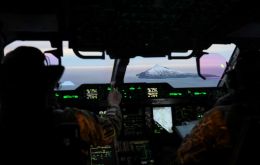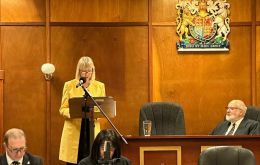MercoPress. South Atlantic News Agency
Falkland Islands
-
Tuesday, June 6th 2023 - 10:25 UTC
Falklands' 35 students in UK had allowances revised to face cost of living crisis

In the Falkland Islands Legislative Assembly this week MLA Leona Roberts responded to a question from MLA Gavin Short on the subject of whether Falklands students were facing financial difficulties while studying overseas and what steps FIG was taking to mitigate this if it was true.
-
Saturday, June 3rd 2023 - 13:00 UTC
Falklands lawmakers discuss food prices and market solvency to encourage competition

A spirited discussion surrounding food prices was prompted by a question from MLA Teslyn Barkman in Legislative Assembly last Wednesday, 31st May. MLA Teslyn Barkman asked MLA Gavin Short about the UK’s government’s decision to investigate food pricing. “Can the Honorable Gavin Short please say whether we here in the Falklands have any mechanisms or agency that could be used to investigate the grocery retail market?”
-
Saturday, June 3rd 2023 - 12:45 UTC
Anniversary of Falklands Liberation Day from Argentine military occupation

To mark the Anniversary of the Liberation of the Falkland Islands from the Argentine occupation in 1982, Gilbert House has arranged a program for next Wednesday 14 June.
-
Saturday, June 3rd 2023 - 12:00 UTC
Falklands farmers face tough times unable to have a fluid sale of their wool clip

Lawmaker Gavin Short rose at the Falkland Islands elected Legislative Assembly this week and asked MLA Teslyn Barkman if she was “aware of any farms that have been unable to sell their wool clip either fully or partially this season.”
-
Friday, June 2nd 2023 - 11:31 UTC
Most Britons feel the Falkland Islands should remain with UK, YouGov poll

People in Britain would be more upset to see Gibraltar or the Falkland Islands leave the UK than they would if Northern Ireland did, according to a new YouGov poll published in British media.
-
Friday, June 2nd 2023 - 08:56 UTC
Operation Coldstare, air patrol in support of South Georgia's fisheries

Last month the British Forces in South Atlantic Islands, BFSAI, stationed in Mount Pleasant Complex, MPC, were involved in the operation COLDSTARE as part of a routine maritime patrol in support of South Georgia and South Sandwich Islands' rich fisheries resources.
-
Thursday, June 1st 2023 - 09:56 UTC
Falklands adjusts Government Reserves Policy to 1,5 times (from 2,5) departmental operating expenditure

Following the sitting of the Executive Council on Wednesday 10 May, a paper was approved to update the Government’s Reserves Policy to hold 1.5 times adjusted departmental operating expenditure in unrestricted reserves.
-
Wednesday, May 31st 2023 - 18:28 UTC
Falkland Islands Government publishes Budget for 2023/24

On 31st May, the Governor of the Falkland Islands made her annual address, state of the Nation, to the Legislative Assembly. In her speech, Alison Blake CMG reviewed last year's challenges and highlights, set out the government's and public service priorities for the year ahead, and paid tribute to the economy.
-
Wednesday, May 31st 2023 - 10:51 UTC
Falklands and HMS Medway honor patrol vessel HMS Leeds Castle

HMS Medway is carrying out patrol duties in the Falkland Islands, filling in while HMS Forth undergoes refit in Gibraltar, but her crew are leaving behind a lasting legacy, which will even be visible from space.
-
Thursday, May 25th 2023 - 11:30 UTC
James Cleverly in Chile: Falklands have a right to self determination and to choose their future

British Foreign Secretary James Cleverly, on a political and trade visit to South America, including Colombia, Chile and Brazil, said the Falkland Islands people have the right to self determination recalling that ten years ago Islanders overwhelmingly voted to remain in the British Family.
